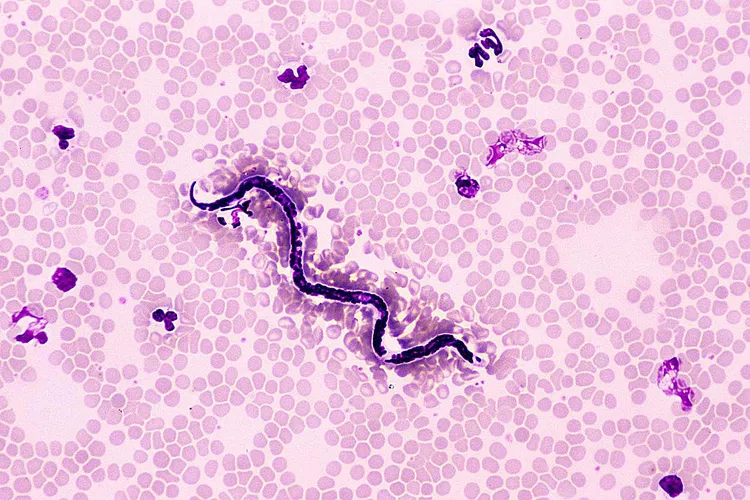
An itchy pup is a pup unable to live her best, healthiest life. But allergy shots for dogs can make her feel better by slowly making her immune system less reactive to whichever allergens are making her scratch.
They can work—very well in some cases—but these injections are a commitment, one that will span your pup's entire life. That's why pet parents should make sure they've considered all options for treating their dogs' allergies first.
There are actually several injection options for dogs with allergies, including immunotherapy, steroids, and an antibody-filled medication called Cytopoint. Your veterinarian or dermatology specialist will help you choose which is best for your dog.
These injections are created to treat signs caused by environmental allergies, particles in the air or outside that make our dogs itch. We're talking pollen, mites, and dander. They don't mitigate allergies to foods or fleas.
They'll also run your dog through several other treatments—more on those later—before resorting to injections, which can be a large commitment in both time and money.
Allergen-specific immunotherapy is the long-haul option, but it can be the most effective for environmental allergies. The shots—administered regularly over time—gradually desensitize a dog's immune system by injecting increasing amounts of the offending allergens into the dog, says Hailey Dideriksen, DVM at VCA 4 Paws Animal Hospital in San Diego.
As the dog encounters increasing amounts of the offending allergens, the more she'll produce a "blocking" antibody that will reduce the itching, she continues. In short, the shots build your dog's tolerance to the allergen, even to the point of eliminating the itching.
"All other therapies for airborne allergies basically aim to suppress the symptoms," Dideriksen says. "Allergen-specific immunotherapy is the only therapy that actually works against the immunological disease. The earlier the immunotherapy is started, the better the results."
Each dog reacts to their shots—created specifically for them—differently, but she says roughly half of them will have "excellent" responses. Another 25% will have a "so-so response" and the last 25% won't have any response.
For owners, the downside is cost. Elaine Martinez, DVM and medical director for VCA Santa Monica Main Street, says immunotherapy can cost thousands of dollars per year. You'll also want to investigate whether your pet insurance will cover the shots before you sign your dog up.
"Owners should [not] pursue allergy shots if the allergy can be controlled any other way or if they are not dedicated to lifelong care and immunotherapy," Dideriksen says.
Good news and bad news on this one. Steroid shots—such as dexamethasone—work very well, Martinez says. They suppress dogs' immune systems, instructing the body to not react to its pesky allergens.
But suppressing your dog's immune system isn't something you want to do regularly due to increased risk for infection. When used chronically, steroids can have a myriad of side effects, Martinez says.
Martinez says Cytopoint is the most commonly recommended allergy shot for dogs because it's both safe and effective. It disables a protein that signals dogs' brains to scratch, chew, and lick their skin. This treatment quells the itching rather than the allergens.
Cytopoint claims more than nine out of 10 dogs experience itching relief after their third injection. According to the University of Wisconsin, dog owners will have a good idea of its efficacy after their pup's first injection.
Cytopoint is reported to be safe to use alongside other treatments for unrelated diseases, per vets at Wisconsin.
Each treatment has several potential side effects, but your veterinarian can tell you more specifically how they might affect your dog.
Martinez says the primary side effect from immunotherapy is worsened allergies for the dog in the first few months or when the dosage changes. (You are introducing allergens into your dog's bloodstream, after all.)
Those side effects, according to Dideriksen, can manifest as:
In addition to suppressing dogs' immune systems, steroids come with several other side effects, Martinez says. Pet parents may see:
Side effects are typically limited, but may include discomfort at the injection site. Martinez says it might cause dermatitis and bacterial skin infections, but those are no different than dogs who received a placebo injection.
Dideriksen says studies have linked several uncommon side effects to Cytopoint, but it's unknown if the treatment caused them. Those include vomiting, diarrhea, lethargy, ear infections, and incontinence.
We'll get to them below, but there are many other ways to treat your dog's allergies, so your pup may not need immunotherapy or other allergy injections. But if nothing else is working, your dog's veterinarian or dermatologist will test your pup to see what she's most allergic to.
Vets may first test your dog's blood, Dideriksen and Martinez say, but a dermatology specialist will likely recommend skin testing to determine the exact immunotherapy regimen.
You'll also need to consider cost. If you have pet insurance before your vet decides allergy shots are necessary, it will "typically" cover the allergy shots, Martinez says. Costs will otherwise vary depending on which treatment and product you end up electing.
Regular injections should be your last resort because there are several other treatments that might be able to limit your dog's itching.
Bathing your dog regularly and washing or changing their bedding can ease their itching. If food allergies are suspected, your vet may recommend starting a food trial. Or your vet can prescribe an antihistamine like Benadryl or other allergy medications if your dog’s symptoms are mild.
You'll also want to make sure fleas aren't causing the pup's discomfort.
Regardless of what's causing the itch, talk with your dog's vet. They'll guide you on the best course of action for your pup. It could be allergy shots—or not.

The First 30 Days With Your New Kitten
The first month is full of changes and excitement for a kitten in a new home. Find out what to expect and what you can do for your new feline friend.
How Old Is Your Cat in Human Years?
As a cat ages, there are often behavioral and physical changes too. Find out how to convert cat years to human years and what to expect at each stage.
What to Buy for Your New Cat: A List of Essentials
Before you bring your new cat or kitten home, there are a number of things to collect or buy so your cat will feel welcomed like a family member.
Human Foods That Are Poisonous to Cats
Many human foods are toxic to cats. Avoid feeding cats table scraps. Instead, feed a nutritious cat food created for their specific nutritional needs.
Cat Food Ingredients to Avoid
When checking the nutrition content of cat food, look for ingredients that are not healthy or show it is of poor quality. Avoid these 3 ingredients.
Should You Feed Your Cat a Raw Diet?
Learn the pros and cons of raw diets for cats, and find out how to choose a raw food diet for your own cat.
Can Cats Eat Corn? Here's What A Vet Thinks
Corn is a common ingredient in cat food and can be a safe treat for cats when fed in moderation. Find out more about how to safely feed corn to your cat.
10 Obscure, Little-known Canine Facts in Honor of National Dog Day
With National Dog Day upon us, it's time to celebrate everything about our favorite pets—even the weirder stuff. Here are 10 obscure facts about dogs you probably didn't know.
The Different Types of Pet-Friendly Workplaces
Discover the different types of pet-friendly workplaces and the benefits they offer employees. Learn how to create a pet-friendly workplace and the best practices for pet owners.
Exploring the Different Types of Pet-Friendly Beaches
Are you looking for pet-friendly beaches? Learn about the different types of pet-friendly beaches, their locations, and tips for visiting them with your pet.
Why Is My Dog Lethargic?
Lethargy can be a sign that something is wrong with your dog. Find out what may be causing this lack of energy and what you should do about it.
Medications to Prevent Heartworm Disease for Dogs
Heartworm disease is a serious risk for all dogs exposed to mosquitos. Find out about the products used to prevent Heartworm disease in dogs.
Can My Dog Eat Tomatoes?
You'll want to keep Fido out of your garden since the tomato plant is toxic, but you can safely offer him ripe tomatoes as a nutrient-packed treat.
15 Best American Cat Breeds
Several cat breeds, including the American shorthair and Bengal, have their origins in the United States. Learn more about these American cat breeds.
Why Do Cats Slap Each Other?
Cats can have some quirky behaviors—one of them being slapping each other. Why do they do this and what can you do to stop it?
Skye Terrier: Dog Breed Characteristics & Care
Learn all about the Skye Terrier, an elegant breed known for its friendly and even-tempered personality with classic terrier traits.
Sloughi: Dog Breed Characteristics & Care
Learn all about the Sloughi, an ancient dog breed known for its impressive running ability, slim stature, and affection toward its family.
English Setter: Dog Breed Characteristics & Care
Learn about the English setter, an excellent hunting breed for pointing and retrieving game. It's also a popular and affectionate companion dog.
Why Dogs Bury Bones and Other Objects
If you give a dog a bone, he might bury it. Why is that? Learn about this burying behavior in dogs and what it means for your pet.
Reasons Why Dogs Run Away and How to Stop It
Dogs can escape, especially if they’re bored and not properly contained. Here are some techniques for stopping your dog from running away.